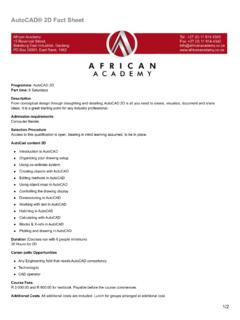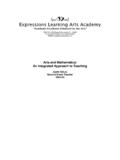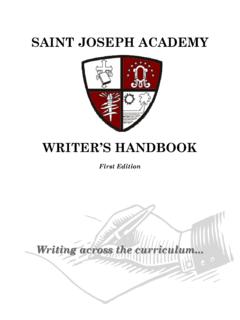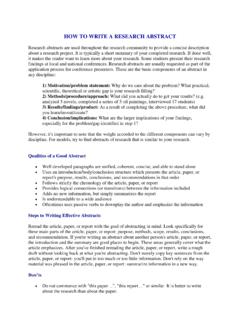Transcription of The Summer Academy - oecd.org
1 Summer Academy on Cultural and Creative Industries and Local Development | 11-15 June 2018, Trento&Bolzano, Italy The Summer Academy The Summer Academy provides training for policy makers and representatives of cultural and creative industries (CCIs). At the end of the course participants will: acquire a deeper understanding of the sector, its needs and dynamics; develop expertise in putting in place effective and integrated strategies and policy frameworks to uncap the full potential of CCIs as drivers for local economic growth, job creation and inclusion. The Summer Academy for CCIs is a three-year project 2018-2020.
2 The first edition will take place 11-15 June 2018 in Trento and Bolzano, Italy. The final conference on Friday 15 June is open to local as well as to national and international stakeholders interested in the event themes, upon registration. Objectives The Summer Academy seeks to: Stimulate sharing of knowledge and experience between participants, experts and professionals from several fields related to CCIs. Provide common interpretation tools that will be applied to the analysis of participants case studies as well as projects and local practices aimed at promoting CCIs and local development. Analyse the process of culture-driven social innovation and the role of CCIs.
3 Foster networking and debate around relevant case studies and best practices from the Trentino and Alto Adige - S dtirol (Italy) region and across OECD. Examine the CCI entrepreneurial process and the importance of creativity and innovation. Promote online and offline social networks among participants in order to exchange knowledge, practical experiences and work methodologies, on CCIs and local development. BackgroundThe past decades have seen the rapid emergence of the culture and creative economy. Cultural and creative industries (CCIs) are at the centre of this dynamic and resilient sector comprising a broad range of activities, including cultural heritage, architecture, music, live performance, publishing, the art market, arts and crafts professions, television and radio, film and video, advertising, design, fashion, video games, These activities use creative skills, add value by applying knowledge and often depend on intellectual property.
4 In many countries, CCIs have grown faster than the economy as a whole, making them attractive to policy makers as drivers of sustainable economic growth and employment. With their extensive knowledge base, CCIs generate value far beyond the narrow economic output of the individual sectors involved. They deliver a broad range of benefits nationally and locally, including: Generating economic growth, exports and employment; Stimulating innovation; Regenerating urban areas; Promoting regions as destinations to visit, live, work and invest in; Strengthening cultural identity and diversity; Supporting social cohesion and integration of marginalised groups; Contributing to well-being.
5 Despite the considerable potential of CCIs, they remain too often undervalued and unrecognised, especially in terms of their ability to access start-up capital and financing. Due to the rapid evolution of CCIs, the difficulties to define their needs, the often intangible impact of culture-led projects, the need to catch up with new trends in cultural and creative tourism, and the fragmentation of policy frameworks, local policy makers often do not grasp the full extent of the sector and deploy insufficient efforts to support it. Overall there is a lack of capacity in designing integrated strategies and leveraging the appropriate policies to fully tap the potential of CCIs.
6 To fill this gap, the Autonomous Provinces of Bolzano (PAB) and Trento (PAT) in cooperation with the Organisation for Economic Cooperation and Development (OECD) and the European Creative Business Network (ECBN) are organising a capacity building Academy to create, develop and strengthen the abilities of organisations, communities and individuals in the cultural and creative sector. This will enable them to confront challenges and achieve goals, work collectively across institutional lines and policy silos, share experiences and develop synergies. Summer Academy on Cultural and Creative Industries and Local Development | 11-15 June 2018, Trento&Bolzano, Italy The course materials and participants case studies will feed into a manual for policy makers and practitioners.
7 The manual will provide practical guidance and recommendations on how to strengthen the CCIs sector, its competitiveness and economic relevance as well as its spill-overs to other industries. It will provide tools and instruments to address existing barriers and needs. Focus The Academy will focus on the relationship between cultural heritage and CCIs, with an exploration of following themes: Creative ecosystems: What kind of environment do CCIs need to flourish? What challenges does the establishment of creative ecosystems pose to policy makers? Policy intervention needs to take a holistic approach to creative ecosystems, focusing on entrepreneurial and creative actors, resource providers and connectors.
8 Knowledge, Skills & Innovation: What are the main skills needed by CCIs? How can knowledge and creativity support innovation? Main topics such as mapping CCI skills needs, adapting training provisions and supporting life-long learning, knowledge spill overs and contamination, and exchange within the CCI sector and with other sectors will be discussed. Culture, Creativity & Finance: How can a financial ecosystem support CCIs? How can we best fund artistic and cultural activities and products? What can be done at city or regional level? Work will focus on the main difficulties related to funding the Cultural and Creative sector, with particular focus on possible solutions and alternatives to traditional credit channels.
9 CCIs for Inclusive Development: What is the link between CCIs and social inclusion? Why and how can culture and creativity improve the quality of life in a community? The module will review how the development of CCIs in a specific territory can enhance social innovation, especially concerning social and cultural inclusion. Methodology The Summer Academy approach is based on a combination of theoretical inputs and practice-oriented working group sessions. A substantial time, during and at the end of each thematic module, is reserved for discussions to generate and exchange knowledge. A modular programme structure: one different topic is developed each day.
10 Key components: Theoretical/methodological essentials ; Work on participants case studies; Field visits to learn from innovative local initiatives in Trentino and Alto Adige - S dtirol (Italy). An active participatory approach and exchange of knowledge/experience among participants during and after the Summer Academy are promoted, through working groups and the development of an active network. The case study in the online registration form is a prerequisite for registration, and will be discussed during the Summer Academy sessions. If selected, the proposed case study cannot be changed or disregarded. Daily agenda structure DAY 1 DAY 2 DAY 3 DAY 4 DAY 5 MORNING Theoretical/methodological essentials Theoretical/methodological essentials Theoretical/methodological essentials Theoretical/methodological essentials Final Conference Working groups Working groups Working groups Working groups Summary of key concepts Summary of key concepts Summary of key concepts Summary of key concepts Lunch break Lunch break Lunch break Lunch break AFTERNOON Presentation / Study visit / Case study Presentation / Study visit / Case study Presentation / Study visit / Case study Presentation / Study visit / Case study Working groups Working
















